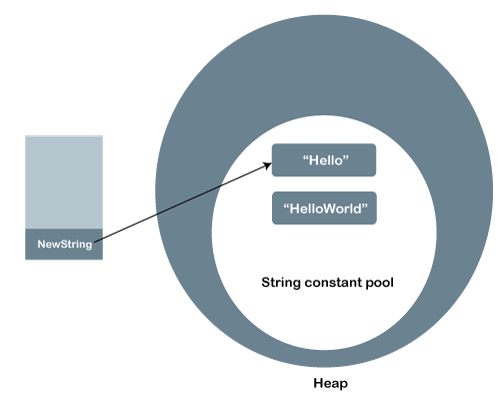Why Are Strings Immutable in Java? Safety and Performance Conveniences
Why Are Strings Immutable in Java? Safety and Performance Conveniences
Blog Article
Checking Out the Benefits of Unalterable Strings in Modern Programming Paradigms
In the realm of modern shows paradigms, the concept of unalterable strings stands as a keystone of durable software program growth. By adopting unalterable strings, programmers can make certain enhanced data stability, improved string security, simplified debugging procedures, enhanced security actions, and effective performance optimization.
Improved Data Stability

By stopping the adjustment of string items, immutability eliminates the risk of unintended modifications to the data they hold. This not just enhances the safety and security of the information however additionally improves the integrity of the code that counts on these strings.
Immutability likewise sustains much safer multithreading atmospheres, as concurrent access to immutable strings does not present the danger of information corruption via synchronised modifications. This residential property simplifies the process of managing strings in parallel programs scenarios.
Fundamentally, immutability functions as a protective shield around the data kept within strings, enhancing their honesty by guaranteeing that once defined, their values remain unchanged throughout the program's implementation.

Boosted Thread Safety
Immutable strings boost the string safety of programs by making sure that once a string item is developed, its value can not be changed. This building eliminates the threat of concurrent strings trying to modify the very same string concurrently, which can lead to data corruption or inconsistent states in the program - Why are strings immutable in Java?. In a multi-threaded atmosphere, where numerous strings gain access to and manipulate information all at once, the immutability of strings gives a degree of safety by assuring that the information remains the same throughout its lifecycle
Streamlined Debugging Procedures
Given the boosted thread security assisted in by unalterable strings, a significant advantage arises in the realm of simplified debugging procedures. Unalterable strings, as soon as produced, can not be changed, making it easier to map the circulation of data and determine the resource of bugs in a program. This immutability ensures that strings continue to be constant throughout the execution of the program, decreasing the likelihood of unforeseen changes that might result in mistakes.
When debugging with mutable strings, developers often experience concerns where a string's value is modified inadvertently, making it challenging to pinpoint the origin cause of a pest. However, with unalterable strings, the data stays unchanged, enabling designers to concentrate on assessing the real logic of the code instead than tracking down where and when a string was customized incorrectly.
In addition, immutable strings streamline the debugging procedure by making it possible for much easier recreation of bugs. Considering that unalterable strings do not change state, developers can recreate and study insects extra effectively, bring about quicker recognition and resolution of issues within the codebase. This streamlined debugging operations ultimately adds to higher software program quality and boosted overall advancement effectiveness.

Boosted Safety Steps
Enhancing data defense and strengthening system honesty, the usage of unalterable strings in software program applications contributes significantly to increased protection actions. Unalterable strings additionally play an important duty in stopping usual safety vulnerabilities such as buffer overflows and SQL shot attacks, as attempts to manipulate string information at runtime are naturally limited.
Furthermore, the immutability of strings improves the predictability of program actions, making it simpler to confirm inputs and site link prevent unexpected changes that might jeopardize safety. This predictability simplifies the process of bookkeeping and validating code, making it possible for developers to determine possible security technicalities a lot more properly. Generally, including immutable strings into software program growth practices not only enhances the robustness and dependability of applications but also enhances their durability versus protection hazards.
Effective Efficiency Optimization
Building upon the foundation of raised safety measures accomplished via the application of unalterable strings, a key aspect to think about in software program growth is efficient efficiency optimization. When handling mutable strings, procedures like concatenation or substring development frequently lead to the creation of brand-new string items, leading to memory overhead and increased processing time. However, with immutable strings, these operations can be optimized to enhance performance. By enabling strings to continue to be constant and stable, unalterable strings facilitate far better memory administration and caching opportunities, ultimately increasing the total performance of the software application.
Since unalterable strings can not be customized when developed, read this they can be shared throughout strings without the threat of unexpected changes, reducing the need for synchronization systems and improving concurrency. Unalterable strings simplify debugging processes as designers can rely on that a string's worth will stay regular throughout the program's execution, getting rid of potential mistakes triggered by mutable state modifications.
Verdict
To conclude, the advantages of utilizing immutable strings in contemporary shows paradigms can not be overstated. Improved data honesty, enhanced thread safety and security, streamlined debugging procedures, enhanced security steps, and effective performance optimization all add to the total efficiency of programs tasks. By including immutable strings into programming techniques, developers can gain from an extra robust and trustworthy codebase.
Immutability, a crucial feature of strings in programming languages such as Java and Python, makes certain that when a string object is redirected here produced, it can not be modified or customized.Unalterable strings enhance the string safety of programs by guaranteeing that as soon as a string things is developed, its value can not be modified. Immutable strings likewise play an essential duty in stopping usual safety and security vulnerabilities such as barrier overflows and SQL injection attacks, as efforts to adjust string data at runtime are inherently limited.
By permitting strings to continue to be consistent and stable, unalterable strings promote far better memory management and caching opportunities, eventually enhancing the general performance of the software application.
Unalterable strings simplify debugging procedures as developers can rely on that a string's worth will continue to be constant throughout the program's execution, getting rid of prospective errors caused by mutable state modifications.
Report this page